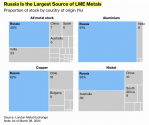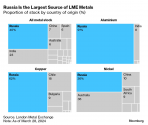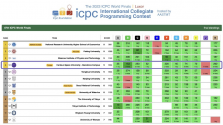Yes there was the global recession in 2008 which caused imports of raw materials to drop due to lower demand for finished products in the West. Then there were the lockdowns and the the oil price war with the Saudis.Russia generally has mid-high economic growth since Putin took over in 2000. Russia's GDP dropped in 2008, due to the global recession, but bounced back. Then it suffered another setback in 2014, due to sanctions after it annexed Crimea. It had another major crisis during Covid and 2022 due to sanctions for... obvious reasons.
You could argue that the sanctions in 2014 had limited impact on the Russian economy. The major impact was on Arctic oil drilling. But the market had an oil glut in the 2010s as it was. And increased production wouldn't have helped things.
Russia's main issue right now is lack of automation in their industrial and service sectors. They have a huge labor shortage. But you should expect further economic growth as factories which closed down after Western 2022 sanctions begin operating again and new factories are built to replace imports. I expect Russian economic growth to remain robust at least until 2026.Remarkably, Russia grew 3+% in 2023. What this tells us, is that generally speaking, Russia is actually very well managed. In fact, Russia would probably be in a very, very good position if it wasn't constantly jerked around by its Western "partners." Of course, I'm not saying that everything Russia does is perfect... but relative to some of its peers it doesn't do bad at all.
Russia will likely surpass Germany in terms of trade volume with China starting this year. And right now Germany, South Korea, and Japan are direct economic competitors to China. As China's industrial economic complexity continues to improve they are starting to outmuscle these countries in the chemical industry, ICs, vehicle production, shipbuilding, etc. You can expect these countries to reply with tariffs on Chinese product imports as the Chinese economy goes up the economic ladder. Russia will continue to be a growing market for China because they simply don't have enough manpower to produce all the products they need and their market lacks economies of scale in production compared with China. As a raw materials exporter to China, Russia will still manage to balance its trade anyway, which is simply not true for most Western industrial economies.If Russia decoupled from the West in 2008 instead of only starting to in 2014... it probably could've been as large as Germany.
As for Russian GDP vs German GDP, you just cannot rely on GDP in USD (nominal) numbers. Russia has a larger economy than Germany as it is and its economy is overall closer to that of Japan. Just compare Russia and Germany economically. Where is this supposed higher German GDP manifesting itself? The Germans don't make their own advanced jet engines, their aircraft manufacturing is just assembly for Airbus, their own IC sector isn't significantly better than the Russian one if you exclude foreign factories operating in German soil, their software sector isn't significantly better than the Russian one either. Except for a couple bright spots like machine tools and automobiles there is little they excel at. Even then with access being cut to some of their largest machine tool markets in Russia and possibly China in the future it is hard to think they will continue having a radiant future in those sectors either. Especially since they have been falling behind in EV tech.
Last edited:





